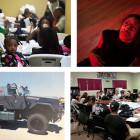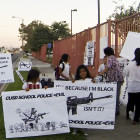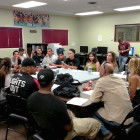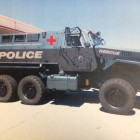
Week in Review: Solitary Confinement, Poverty and Militarized Police
|
Residents talk about Harlem housing feud. Compton residents protest school police use of military-grade weapons. And more.
Juvenile Justice Information Exchange (https://jjie.org/page/252/)

In late September, Torri was driving down the highway with her 11-year-old son Junior in the back seat when her phone started ringing.
It was the Hamilton County Sheriff’s deputy who worked at Junior’s middle school in Chattanooga, Tennessee. Deputy Arthur Richardson asked Torri where she was. She told him she was on the way to a family birthday dinner at LongHorn Steakhouse.
“He said, ‘Is Junior with you?’” Torri recalled.
Earlier that day, Junior had been accused by other students of making a threat against the school. When Torri had come to pick him up, she’d spoken with Richardson and with administrators, who’d told her he was allowed to return to class the next day. The principal had said she would carry out an investigation then. ProPublica and WPLN are using a nickname for Junior and not including Torri’s last name at the family’s request, to prevent him from being identifiable.
When Richardson called her in the car, Torri immediately felt uneasy. He didn’t say much before hanging up, and she thought about turning around to go home. But she kept driving. When they walked into the restaurant, Torri watched as Junior happily greeted his family.
Soon her phone rang again. It was the deputy. He said he was outside in the strip mall’s parking lot and needed to talk to Junior. Torri called Junior’s stepdad, Kevin Boyer, for extra support, putting him on speaker as she went outside to talk to Richardson. She left Junior with the family, wanting to protect her son for as long as she could ...

Residents talk about Harlem housing feud. Compton residents protest school police use of military-grade weapons. And more.

Dropping out of school is not a singular event. It is a slow process of disengagement that requires us to look at the primary reasons children are absent and then devise mechanisms to pull them back from the brink.

This summer I visited Rikers Island in New York along with 15 other members of the Anti-Recidivism Coalition (ARC) and had a chance to speak with the inmates.

The Compton (Calif.) Unified Board of Education approved in July allowing campus police officers to have AR-15 rifles on school grounds. There was no community input.

In 1997, as the youngest chief of police to be elected to the city of Westwego, La.’s municipal office, I was confident in my ability to serve and protect. My previous law enforcement training and experience taught me the value of holding citizens accountable for law violations — including adolescents. Community safety was of paramount concern and the reason I was elected.

The boys at the table in the Juvenile Hall in Los Angeles are tense. Teacher Johnny Kovatch doesn’t hold back, aggressively pushing them to write more and dig deeper inside themselves.
Nearly one in five children in the United States lived in poverty last year, with a much higher proportion of poverty among African-American and Hispanic children, new U.S. Census figures released Tuesday show.

More than 20 national education and civil rights advocates sent a letter Monday to Department of Defense officials, urging them to stop giving U.S. school police departments anti-mine vehicles, military-grade firearms like M16s and even grenade launchers.